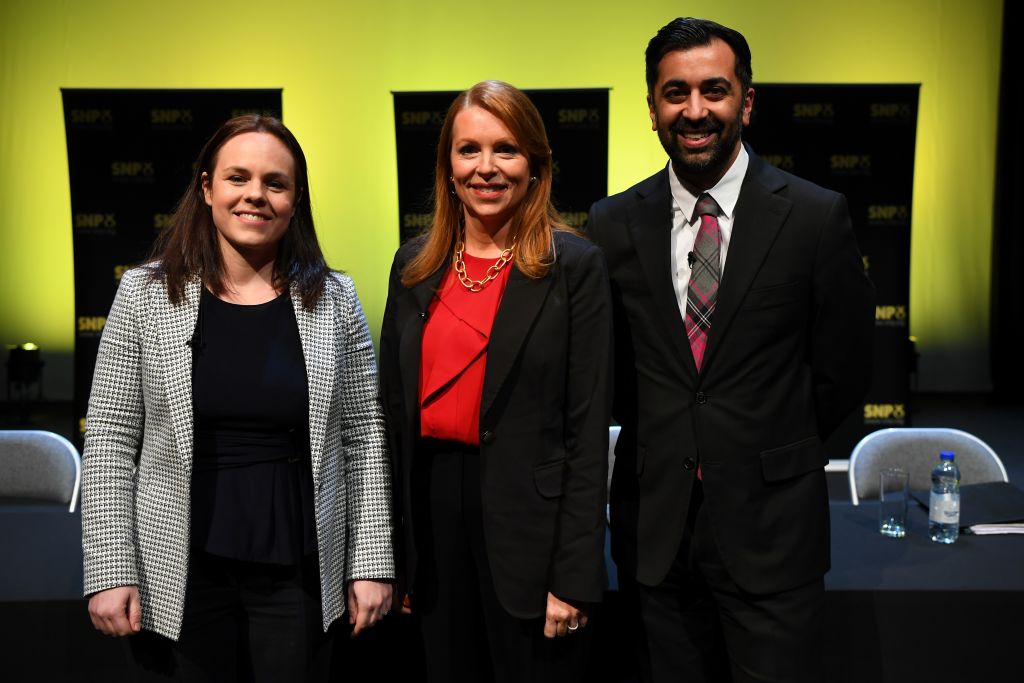Independence was the main focus at the first hustings of the SNP leadership race last night. Humza Yousaf called for a slower route to separation. Ash Regan clarified the workings of her ‘voter empowerment mechanism’. But Kate Forbes unveiled a more radical approach: announcing she would fight for another independence referendum within three months of the 2024 general election.
‘For too many years, we’ve become the party of referendums,’ Forbes said, ‘rather than the party of independence.’ But, in an apparent contradiction, she then pledged to ‘fight for the right’ to hold an independence vote within three months of the next general election. When pressed later, she confirmed that her strategy – notably similar to Sturgeon’s – would involve Forbes demanding a Section 30 order from the UK government. This would trigger the mechanism that would allow a second independence referendum to go ahead. But Sturgeon has already tried – and failed – with this approach, so what makes Forbes think her attempts will be successful? Like the other two candidates, Forbes has no way of ensuring that the UK government agree to her plan. She appears to be on track to make the same mistakes as those gone before her.
Forbes has no way of ensuring that the UK government agree to her plan. Is she on track to make the same mistakes as those gone before her?
Still, Forbes insisted, the SNP dream is ‘coming sooner than most people think’. ‘In 2024, we will put independence front and centre,’ she said. But hasn’t the SNP – with the exception of during the pandemic – always done that, to the increasing disgruntlement of many in Scotland? Only 16 per cent of Scots view independence as a top priority for the Scottish government, meaning that many SNP voters – and potentially some members – certainly do not. Is it really the best option for Scotland to continue to tie itself up in knots over independence while its health service collapses and the cost of living crisis ensues?
On independence, Yousaf was keen not to ‘get bogged down by process’, saying that even as first minister he would want to get onto the streets, ‘chap doors’ and talk to people about his vision for Scotland. He described the need to get ‘a sustained majority for independence’ that doesn’t ‘fluctuate from poll to poll’ so that independence can become ‘political reality’. But he didn’t address exactly how he would negotiate with Westminster on this – the elephant in the room on this point given the fact that both Indyref2 and the de facto referendum options are off the table.
Once again, Regan waxed lyrical about the major deviation her own campaign offers in her process for reaching independence: the ‘voter empowerment mechanism’ (VEM). Different though her approach may be, there is still no clear path to negotiations with the UK government on independence. Quizzed on how the VEM would work at her campaign launch last Friday, Regan started by saying that ‘this has got nothing to do with the UK government’. She quickly clarified later that ‘what I meant was Scotland is not going to seek permission to become an independent country’. She was no clearer on this last night.
Regan is clearly the wild card candidate: she has so far announced that she wants to slow the race to net zero and decelerate plans to phase out oil and gas. Last night, she threw out another left field idea: perhaps children in Scotland should start school at seven, rather than four or five. Whatever her odds are in this contest, at least she keeps it interesting.
Yousaf, meanwhile, relied upon emotional appeal rather than outlandish policies to fire up the SNP base. As Stephen Daisley has written on Coffee House, Yousaf generally came across better in last night’s debate than he has done throughout the contest. He spoke well, playing on the heartstrings of his audience by bringing in family references from the get go. ‘Never in [my grandfather’s] wildest imaginations or dreams,’ he said, ‘could he imagine that his grandson could be in contention for the job of First Minister of Scotland. The reason I say that is because I want to start with a bit of hope.’
But if Yousaf was fluent and relaxed, Forbes was markedly more tense; a school teacher holding an assembly as opposed to a leader rallying his troops. Forbes jumped straight in to her mission statement: the need for poverty eradication in Scotland, and therefore the need for Scottish independence. This debate is about a Scotland ‘where tolerance is the ruling norm’, she said, a nod to the last ten days of criticism she has faced for her religious views – and to the fact that she pledges not to let them get in the way of policy, an assurance that, from her, those from the LGBT community have nothing to fear.
Mindful of the warning at the start of the event from Mike Russell to ‘remember that the event is being live-streamed’, SNP members did, in fact, keep the evening pretty civilised, with no heckling or aggression directed at any of the three candidates.
But despite candidates having two hours to discuss their policies, there are a good many questions, specifically those on independence, that remain unanswered. No candidate has, as of yet, presented a feasible way to negotiate independence with the UK government. In her desperation, Forbes appears to be copying Sturgeon’s unsuccessful methods, while Yousaf and Regan are struggling to provide workable solutions themselves. At least we’re not short of hustings to grill them on though: there are eight more to go before voting begins.







Comments